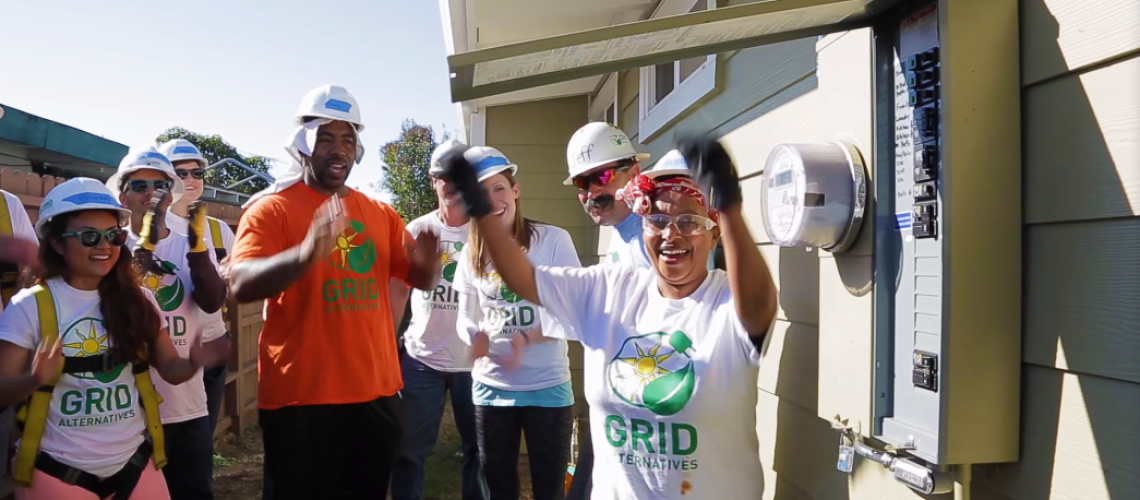By 2030 the renewable energy market is forecast to require more than one million employees. Reactivate, a nationwide solar training program that uses the Building Equity in Solar Training (BEST) protocol has opened in Chicago to meet the needs of an expanding industry.
In partnership with Grid Alternatives, Solar Energy International (SEI), Jobs for the Future and local partners Elevate and the Community and Economic Development Association of Cook County, Reactivate launched a workforce training program focused on the implementation of a nationwide equitable workforce training program that will provide skills-based training and certifications for Chicago residents seeking a career in solar, energy storage and EV charging.
“Utopia Hill and the Reactivate team spearheaded and sourced several organizations to put this project together that will start in Chicago and spread to other cities across the country,” said Adewale OgunBadejo, vice president of workforce development at Grid Alternatives.
BEST is an outcomes-based workforce training program that places importance on quality and a commitment to an equity-driven model. This process includes working with local partners to ensure that individuals from underserved and disadvantaged communities have the support to enroll, complete training, enter a career with family sustaining wages, and overcome additional barriers.
Additional BEST support includes paid training, tutoring, transportation assistance, childcare assistance, and case management. Trainees to the program include women, members of the BIPOC community, justice-involved individuals, and individuals from energy transition communities.
The training platform uses industry training framework developed to provide multiple certifications such as the North American Board of Certified Energy Practitioners (NABCEP) installer certification, OSHA 30, First Aid/CPR, as well as operator training, general building trades training, and customized content tailored both to occupational demand and to the needs of the target populations.
There is also an emphasis on leadership development, problem-solving, teamwork, and a high work ethic. The program uses a mix of classroom training and hands-on training approaches, which Reactivate views as critical to ensuring trainees are ready to enter the solar workforce upon graduation from the program.
“We were honored to have been invited to share our 30+ years of providing industry leading solar training and curriculum development in support of this initiative,” said Chris Turek, vice president of business development, SEI. “As the clean energy economy grows, it is critical that we ensure a diverse and equitable workforce shape the future of the solar industry.”
Reactivate, in collaboration with its five partnered agencies, is currently running the BEST program in Chicago. The first cohort of individuals entered a 16-week program in February 2023, with an expected graduation in June 2023. During the program trainees will have the opportunity to meet with several employers including those working on Reactivate’s portfolio of community solar projects in the Chicago area.
For more information or to apply for the Reactive workforce program, click here.
In February, Solstice Power Technologies, a customer management platform for community solar development, began enrolling subscribers on three low-to-moderate-income (LMI) community solar projects developed by Reactivate, a joint venture of developer Invenergy and Lafayette Square, an impact investment fund.
Reactivate’s program is specifically for income-eligible residents whose household must verify as 80% or less of the Area Median Income (AMI). Prospective enrollees can check if their household meets the AMI qualifications on Solstice’s website through the “See If You Qualify” prequalification form.
Lafayette Square and Invenergy formed Reactivate in January 2022 as a community solar energy platform supporting development in underserved communities. The platform will finance, acquire, develop, and operate solar energy projects primarily serving LMI communities and areas disproportionately affected by the clean energy transition.
According to Reactivate, the company isn’t limited to community solar projects, and will also develop small-scale utility solar projects, energy storage, building electrification, and EV charging infrastructure. Beyond project financing and development, the company attests that it is focused on creating development, construction, and operational focused jobs while focusing worker training efforts on traditionally underrepresented segments of the workforce and those transitioning to the renewable energy industry.
By 2030, Reactivate seeks to develop 3 GW of renewable energy capacity, save $50 million in energy costs for LMI households, sign 100 contracts with minority or women-owned contractors, and facilitate workforce training for 2,500 underserved workers.



